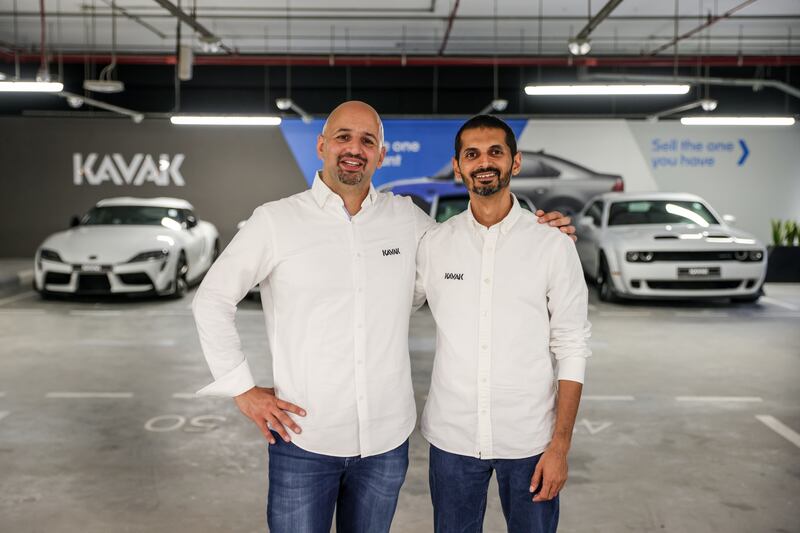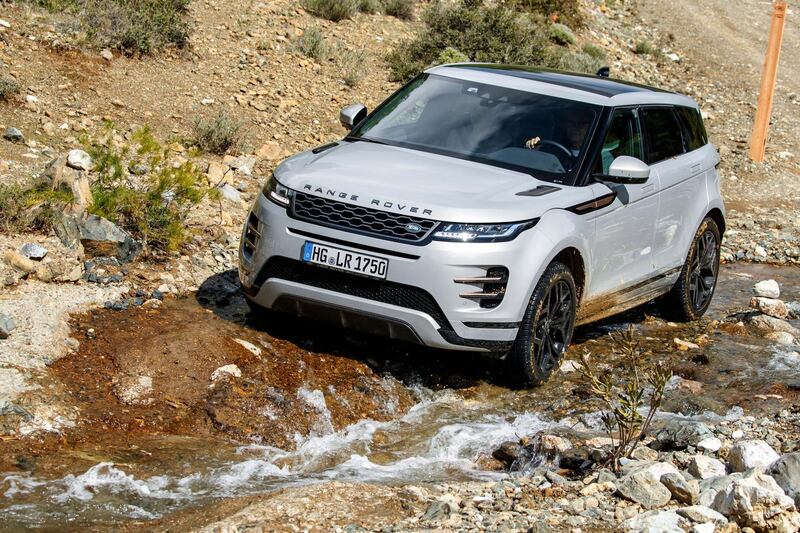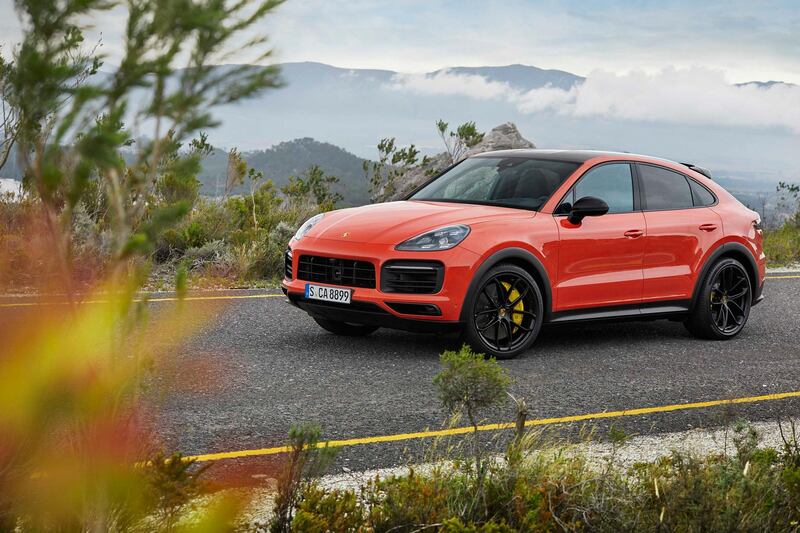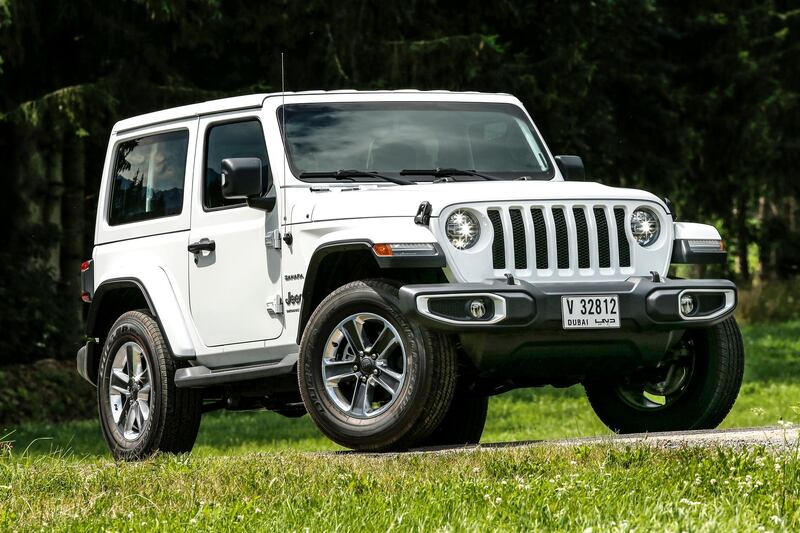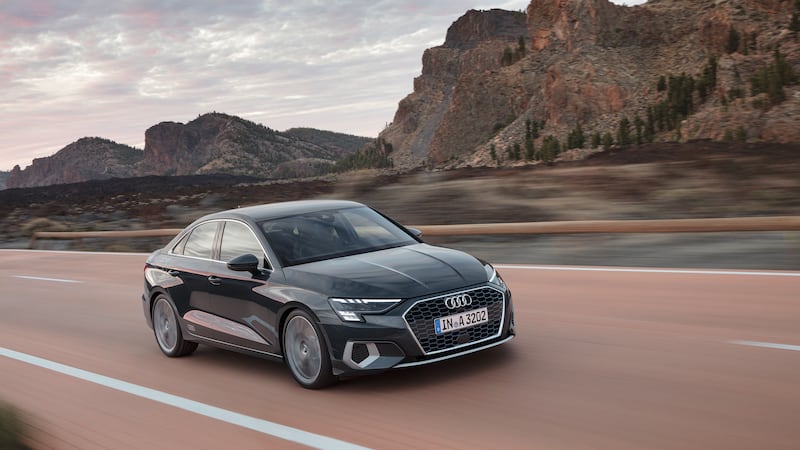UAE used-car retailer Carzaty was looking to raise new funding when Mexico’s pre-owned car platform Kavak tabled an offer to buy them out about two months ago.
The path was clear — merge with SoftBank-backed Kavak, which was ready to commit $130 million to the region over the next two years.
Before the merger, Carzaty raised close to $6 million in equity funding and had $4 million in debt.
“We were thinking of going much, much larger because we had proven the concept,” says Marwan Chaar, co-chief executive of Kavak GCC, the name of the business after it was rebranded when the merger was finalised.
“We were looking to raise somewhere in the range of $20 million so we could scale up the business. And we ended up choosing the path of full acquisition, instead of raising further funds.
“We started in Oman, and then we expanded to the UAE … And we thought this is the right time to go big or go home.”
Mr Chaar founded Carzaty in Oman at the end of 2018 along with Hassan Al Lawati. The company buys used cars, fixes and resells them, but with a twist. It uses proprietary data and market intelligence to buy specific cars that are in demand but are scarce and expected to be sold quickly.
“With the entry of a large player like Kavak who has committed $130 million to the region, we are taking a part of this and putting it in physical capital expenditure that will better serve our customers,” Mr Chaar says.
The company conducts rigorous checks and reconditions the cars before selling them. It provides the full range of services to customers, helps customers trade-in their existing cars and also connects would-be buyers with financial services companies that can provide funding.
The retailer uses various ways to buy used cars and these include direct purchases from consumers or from leasing companies.
The company, however, did not disclose their margins while buying and selling cars.
The UAE used-car market experienced unprecedented growth in 2021, and is expected to grow at a compound annual rate of 8.3 per cent from 2021 to 2025, according to a report by data platform Research and Markets.
More than a million used cars are expected to be sold in the country by 2025, the report said.
The global shortage of microchips, which has affected new car supply, is boosting the demand for used cars, it said.
After its merger with Carzaty, technology and data-driven marketplace Kavak plans to build the largest used-car operation in the Gulf.
Kavak, which was founded in 2016 by Carlos Ottati, has invested in the construction of a 15,000-square-metre customer centre in Festival Plaza in Dubai. When fully operational, it will employ 150 mechanics and staff and will handle 1,300 vehicles a month.
Valued at $8.7 billion, Kavak is the sixth-largest car dealer in Mexico and is backed by venture capital players such as SoftBank, General Atlantic and Tiger Global.
It claims to be the most valuable start-up in Latin America with 7,000 employees, an inventory of more than 30,000 cars and 75 operative centres.
The Latin American used-car dealership, which has a presence in 10 countries including Mexico, Brazil, Argentina and Turkey, will initially launch operations in the UAE and Oman as the first step of its expansion plans in the GCC, followed by Saudi Arabia.
When it sets up operations in the kingdom, Kavak plans to build a 15,000-square-metre customer centre in Riyadh.
While it is uncertain when Kavak GCC we will begin operations in Saudi Arabia, “that is [definitely] the next market we will be entering”, says Mr Chaar.
“We are not looking to expand to any more GCC markets yet. Our focus is on expanding our offering in the UAE,” he says.
After merging with Kavak, “it is not just the new name that we have launched … we have built a full reconditioning centre, where we fix the cars in-house”, says Mr Chaar.
“We have 150,000-square-foot facility in Al Quoz. We built a retail hub and we grew the team — from 22 employees in March last year to about 140 today.”
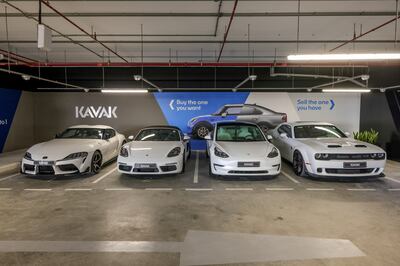
Inventory has also gone up — from about 50-60 cars earlier to now about 400 cars, “which makes us one of the largest automotive retailers in the country”, says Mr Chaar.
“The next step is to get an inventory of about 1,000 cars and beyond that.”
Kavak sells cars at all price points, according to Mr Al Lawati, who also serves as the co-chief executive of Kavak GCC.
“Our typical average selling price is between Dh100,000 and Dh150,000. That is our sweet spot … typically, cars that are less than five years old and less than 120,000km or 130,000km,” Mr Al Lawati says.
“Now, that is a little bit higher than the market average price, which is around Dh80,000 ASP [average selling price]. But we do things now in-house … so we quality control everything.”
The company sells a wide range of vehicles — from pickups to Teslas, luxury sedans and sports cars.
Kavak, which counts multi-brand retailers such as India-based Cars24 and Dubai’s Al Futtaim Automall among its competitors, says the company’s offering had not changed after the completion of the acquisition deal.
“And that is why it was such an easy decision for Carzaty to join forces with Kavak, because the culture and the USP [unique selling proposition] of Kavak was very similar to ours,” Mr Chaar says.
The company offers quality guarantees, long-term warranty and return policy on the vehicle.
“We typically reject roughly 98 per cent of the cars — for a variety of reasons. In UAE, specifically, often times, we find that the cars are missing service history or have too high a mileage and that, generally, tends to be for us a red flag,” says Mr Al Lawati.
And on the cars that the company ends up buying, it spends “about Dh3,000 per car” on average to recondition them.
Meanwhile, the coronavirus pandemic affected the company’s business positively, according to Mr Chaar.
“Demand for used cars has gone up a lot since Covid hit. It is not like people have been downsizing or buying less cars or selling off their cars. It is actually quite the opposite,” he says.
“A few things have happened since Covid: the new car supply has gone down, which means people are forced to buy used [cars]; people are also more conscious about saving money, so they would rather buy a used car than a new car; and people, post-Covid, were less excited about ride-sharing.
“Used car demand is still very strong. And we expect this trend to continue.”
Q&A with Marwan Chaar and Hassan Al Lawati, co-chief executives of Kavak GCC
Where do you want to be in five years?
Marwan: In the next five years, I would love to continue building on the growth of Kavak and hopefully, working on another start-up with positive social impact.
Hassan: Definitely, would love to focus on investing in companies focused on social impact, specifically focused on the education sector.
What other successful start-up do you wish you had started?
Hassan: [We would like to] focus on tackling bigger markets such as Saudi Arabia first.
If you could do it all differently, what would you change?
Marwan: I wouldn’t do a thing differently. In the end, everything worked out the way it was supposed to and I am incredibly grateful for the highs and lows.
Who is your role model?
Hassan: People such as Chris Blauvelt, founder of Launchgood, who have found ways to leverage technology for meaningful social impact.
What is your next big dream that you plan to make a reality?
Marwan: I would love to one day return to the energy industry and work in the global transition to a low-carbon future.
Hassan: To focus on the use of technology to make education more accessible to everyone.
What is your biggest lesson from launching Carzaty?
Marwan: Timing is everything, so make sure you have enough patience and persistence to be there when the opportunities arise.
Hassan: It really takes a village to build something good.
What new skills have you learnt since launching your business?
Marwan: I have now gone through the entire start-up life cycle. From idea conceptualisation all the way through to the exit. It was a full journey.
Hassan: Always stay humble, there is only so much you can control.
